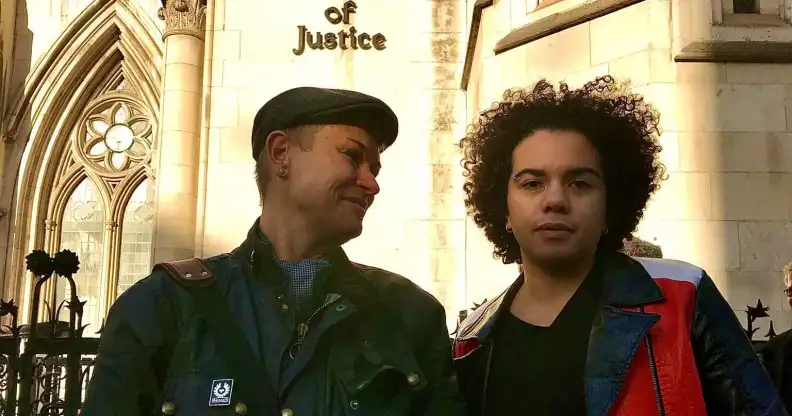‘Loving parents’ can consent to puberty blockers on their child’s behalf, High Court says in landmark ruling

Keira Bell (right) outside Londons Royal Courts of Justice after winning her judicial review on 1 December, 2020. (Twitter/ Belstaffie)
The High Court has ruled that a “loving parent” can consent to a child taking puberty blockers, in part reversing last year’s decision in the Keira Bell case.
On 1 December, 2020, the High Court ruled that transgender children under the age of 16 must understand the implications both of puberty blockers and of potentially moving on to hormone therapy in order to consent to the medication.
The case was brought by Keira Bell, who began taking blockers aged 16 and now regrets that decision, and Mrs A, who wants to prevent her trans teenager from accessing the medication.
The court ruled that it was “doubtful” that 14 to 15-year-olds would be able to comprehend “the long-term risks and consequences” of the treatment, and “highly unlikely” for 13-year-olds to do the same. The devastating ruling meant that court orders would have to be obtained for every under-16 to access treatment, in order to prove that they were “competent”.
Later in December, the Tavistock and Portman NHS Trust, which runs the UK’s only gender identity clinic for trans children, began the process of appealing ruling.
The case of AB v Tavistock and Portman NHS Trust, funded by Good Law Project’s Trans Defence Fund, was heard earlier this month, and the High Court’s ruling released today (26 March) states that parents are able to give consent on behalf of their children to take puberty blockers.
In the ruling, Justice Nathalie Lieven said that while the Bell case found it was unlikely that children could be found competent enough to consent to the gender-affirming care, “the key difference from Bell is that parents are, in general, in a position to understand and weigh up these matters and consider what is in the long and short term best interests of their child”.
She continued: “They are adults with full capacity and as the people who know their child best, and care for them the most, will be in a position to reach a fully informed decision… I agree with the view expressed that judges do not necessarily know best, and that judges should be slow to displace the decision making role of committed and loving parents.
“That is not to say that there are not cases where the Court, acting in an independent way, may not be in a better position to make a decision than the parents.
“However, such cases will… arise in individual cases, not simply on the category of prescribing [puberty blockers] to children.”
The Good Law Project said in a statement: “The decision is hugely significant. The barriers to accessing puberty blockers through the Tavistock were already enormous. Very few children were able to overcome them without parental support.
“The decision means that children with that support will no longer be barred from accessing puberty blockers by the Bell decision. It is not unreasonable to describe this morning’s decision as in large part reversing the practical effects of Bell.”
Although the ruling is great news, it will not help vulnerable trans kids who are without parental support, and serious issues remain with the original ruling, including risks to young people’s rights to abortion and contraception.
An appeal against the Bell ruling as a whole will begin on 23 June, 2021.

